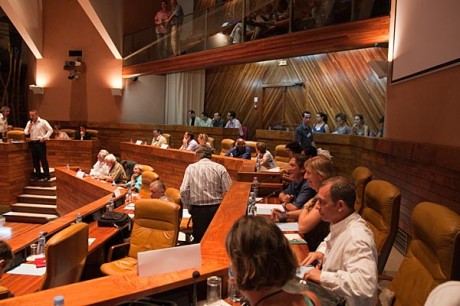La communication The Rise of Sustainable Urban Development on Reunion Island présentée lors du Ecocity World Summit 2011 à Montreal fait partie des 20 communications sélectionnées et publiées par www.ecocitybuilders.org sur plus de 300 présentations internationales.
L’article présente les enseignements des travaux conduits par Christian Boyer et Dominique Dias de 2008 à 2010 pour la réalisation du référentiel des Quartiers Durables Réunionnais pour l’Etat dans le cadre du Plan Ville Durable. Ils y ont conduit une réflexion concertée avec plus de 200 acteurs locaux, pour la mise au point de méthodes adaptées au contexte insulaire et tropical et à un besoin évalué à plus de 200.000 nouveaux logements à l’horizon 2030. Ces enseignements réunionnais sur les processus décisionnels des démarches de projet urbain ont contribué à la mise au point du 2ème concours national Ecoquartiers en 2010.
Abstract :
The Reunion Island Sustainable Districts program is a case study and a theoretical development for Eco-city policies. It introduces a methodology which emphasises the decision-making process, making this ‘key’ for the success of each project. Currently, it is being employed in Reunion Island in the building of thousands of houses. This methodology could be generally applicable to other Frenchs territories and in most democratic countries.
Reunion Island utilises sustainable urban development as part of its governmental program: Green Energy Revolution – Reunion island. A conference defined the RISD concept and the means to its realisation. Local debate highlighted that the complexity of technical analyses could alienate politicians from these urban development projects and hence, strategic decision-making policies. Through financing the project conception, co-ordinating politicians and professionals and their training, the partnership program promotes an integrated realisation of each project. Twenty projects are currently focused on the challenges of sustainable town planning.
Reunion Island with 800,000 inhabitants shows growth in terms of population, economic, social and cultural development. Limited territory leaves little room for the compensation of urban dysfunctions by the urban spread. Furthermore, increasing petrol and transportation costs mean overseas trade supply is threatening the island economy.
Rapid development calls for an additional 200,000 houses by 2030. To deal with these expectations, spatial planning must optimise land use, housing density and urban efficiency. In promoting local diversity and by combining the needs, the uses and the resources of the island; improving public spaces and networks and creating an animated and integrated development; local, economic and cultural development is ensured. The island’s isolation highlights the need for short distance supply and self-sufficiency. The success of the planned development is essential in preventing an impending population growth and resultant expanding shantytowns from destroying an exceptional environment.
